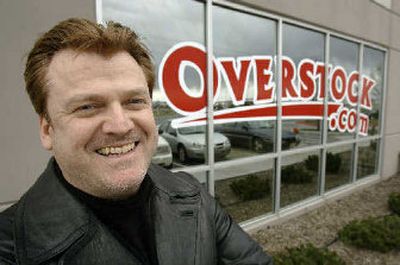Short sales, short temper

SALT LAKE CITY — Most people buy stock hoping the price goes up, but hedge fund manager David Rocker was “shorting” shares of Utah-based Internet retailer Overstock.com Inc., betting the share price would decline.
Rocker’s fund was making a legal bet that Overstock shares in 2004 were overvalued and due for a correction. Overstock.com CEO Patrick Byrne, however, sued, accusing New York-based Rocker Partners of collaborating on disparaging reports with the stock-research firm Gradient Analytics of Scottsdale, Ariz., while Rocker was shorting the shares.
Byrne, a former boxer-in-training who holds a black belt in karate, is fighting mad at unnamed “Sith lords” he says are out to ruin America’s small companies. Not only is he suing, he enlisted Utah’s governor and legislators to crack down on short selling, and federal regulators are investigating his complaints.
Hedge-fund managers and other institutions defend short selling as legitimate way to trade on a company’s perceived shortcomings and say Overstock.com became a target only because of its poor performance.
Short sellers borrow stock hoping the share price declines so they can return it to brokers and pocket the difference. Byrne complains Overstock has been a target of persistent naked short selling, where brokers send IOUs through a stock clearinghouse when they run out of shares to lend for short selling. The practice tends to lower a company’s share price by artificially creating more sellers than buyers.
Byrne’s allegations have prompted an investigation by the U.S. Securities and Exchange Commission, which also is looking to tighten rules on IOUs that Byrne says let short sellers grab profits without having to assume risks.
Unwilling to wait for action at the SEC — where “the wheels grind slowly,” said Overstock counsel Jonathan E. Johnson III — the company took its case for relief to Utah Gov. Jon Huntsman.
On May 26, Huntsman signed a bill passed days earlier by the Legislature that threatens Utah brokers with fines starting at $10,000 a day for accumulating too many unsettled trades in a company — a sign of a large volume of naked short selling.
Byrne, who is Utah’s No. 1 political donor — he gave $75,000 to Huntsman’s successful campaign for governor in 2004 — got Huntsman to add the bill to a special one-day session of the Legislature.
Byrne “gives much more to charity,” said Overstock.com spokesman Scott Blevins, who argued the bill “went through the normal legislative process” earlier in the year, when it languished for lack of action.
Blevins said there was “no credible link” between Huntsman’s signing of the bill and the donations he received from Byrne, who made them “long before” he recognized that short sellers were targeting his company. The spokesman said Byrne’s contributions were “piddly” compared to donations by securities firms to state and federal candidates.